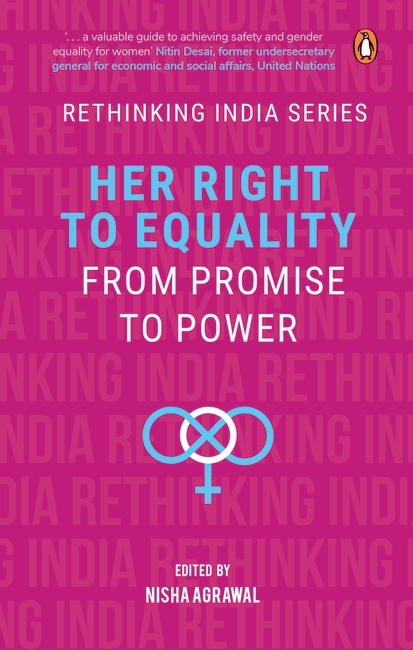
“I echo [the authors’] siren call for urgent disruptive change that will shatter patriarchal norms”–Winnie Byanyima, Executive Director of UNAIDS
“…a valuable guide to achieving safety for women and gender equality at home and in social, political and economic life.”-Nitin Desai, former Under-Secretary General for Economic and Social Affairs, United Nations
“A must-read for anyone who believes that women in India deserve better…”-Alankrita Shrivastava, film director, Lipstick Under My Burkha
“Harvesting existent knowledge as a way of shaping the future is a valuable idea… [This book] fulfills exactly this need…”-Devaki Jain, feminist economist and author of The Brass Notebook
The sixth volume in the Rethinking India series, in collaboration with the Samruddha Bharat Foundation, looks at the reality of gender equality in the country against the promises of justice and equality made in the Constitution of India. What it finds is that even today, India remains an unequal country and that women control, at best, about 10-15 per cent of economic and political resources. While there has been progress in some areas, in many other areas there has been very little and uneven change.
One of the main reasons for this slow progress is that social norms that assign particular roles and identities to men and women are ‘sticky’ and hard to change. In India, a highly patriarchal society, these norms give very little power to women and, consequently, they have little control or influence over decisions taken within their households, in markets or in political spaces.
Challenging the status quo can cause a backlash, leading to high levels of violence against women in the domestic sphere, the workplace and in public places. If we are to see a more safe, just and equal society by 2047, a hundred years after Independence, it cannot be business as usual. Her Right to Equality argues that what we require is disruptive change through individual and collective leadership and action.
Essays by Flavia Agnes, Rajini R. Menon, Amita Pitra, Sumitra Mishra, Shubhika Sachdeva, Poonam Muttreja, Sanghamitra Singh, Swarna Rajagopalan, Ashwini Deshpande, Archana Garodia Gupta, Sushmita Dev, Kanimozhi Karunanidhi, Tara Krishnaswamy, Bina Agarwal.
Imprint: Vintage Books
Published: Mar/2021
ISBN: 9780670092994
Length : 256 Pages
MRP : ₹699.00
Promises of gender equality and justice have been made, repeatedly. They have failed repeatedly. The roots of misogyny form the foundations of our civil society, and the essays in Her Right to Equality raise crucial questions about the status of gender equality in our country. It scrutinizes institutions that are meant to safeguard the rights […]
